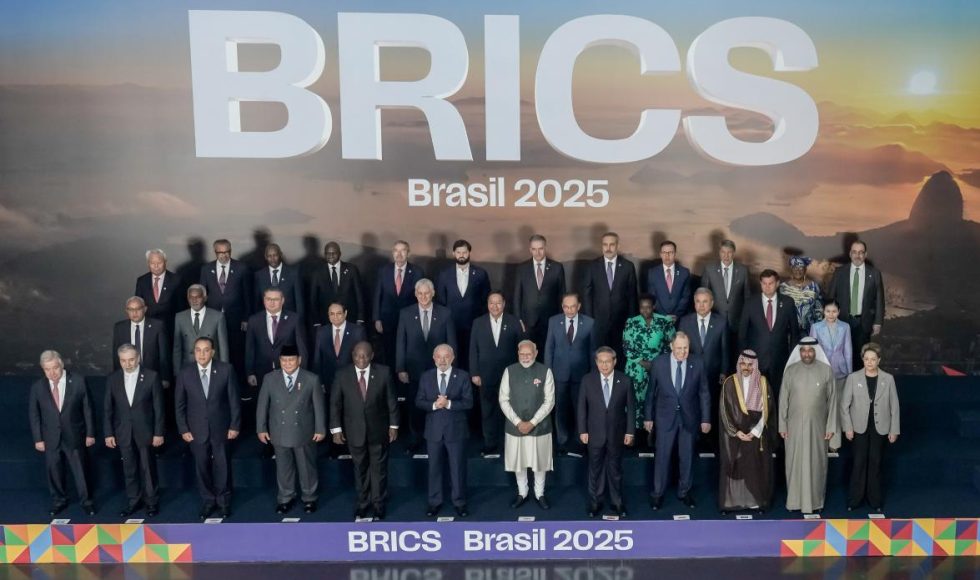
ASTANA – Deputy Prime Minister and Foreign Minister Murat Nurtleu represented Kazakhstan for the first time as a partner country at the 17th BRICS Leaders’ Summit in Rio de Janeiro on July 7.
Established in 2006, the BRICS owes its name to the initials of its five member states – Brazil, Russia, India, China, and South Africa. Six new members – Egypt, Ethiopia, Indonesia, Iran, Saudi Arabia, and the United Arab Emirates – joined in 2024-2025.
Ten partner countries attended the summit. Among them are Belarus, Bolivia, Cuba, Kazakhstan, Malaysia, Nigeria, Thailand, Uganda, Uzbekistan, and Vietnam.
The first day of the summit was attended by heads of state and government, high-level representatives of BRICS member and partner countries, and heads of international organizations.
Opening the summit, Brazil’s President Luiz Inácio Lula da Silva warned of a deepening crisis in multilateralism, pointing to the rise in global conflicts and their far-reaching effects on national autonomy, security, and the global economy.
Discussions focused on expanding representation from the Global South in global governance, rising protectionism in trade, and increasing geopolitical tensions.
Kazakhstan’s vision
In his remarks, Nurtleu underscored Kazakhstan’s commitment to promoting a just, inclusive, and sustainable world order based on the UN Charter and international law, reported the Kazakh Foreign Ministry’s press service.
“Astana pursues balanced and multivector foreign policy, building bridges, not walls, and fostering partnerships with all nations,” he said.
The minister expressed support for enhancing the role of the middle powers from Asia, Africa, and Latin America in global decision-making. He highlighted Kazakhstan’s international initiatives, including the establishment of the UN Regional Center for Sustainable Development Goals for Central Asia and Afghanistan in Almaty, as well as hosting the Congress of Leaders of World and Traditional Religions, with the next scheduled this fall.
Nurtleu also emphasized Kazakhstan’s interest in deepening economic cooperation with BRICS countries and advancing digital technologies.
“Kazakhstan is ready to cooperate in promoting a human-centered, inclusive, and sustainable approach in the name of a just and fair digital future,” he said.
On the sidelines of the summit, Nurtleu met with UN Secretary-General António Guterres, WHO Director-General Tedros Ghebreyesus, Asian Infrastructure Investment Bank (AIIB) President Jin Liqun, and Belarusian Foreign Minister Maxim Ryzhenkov.
Climate action and health cooperation
Nurtleu continued his participation at the BRICS summit by addressing a session titled Environment, COP30, Global Health. The session focused on environmental protection, preparations for the 2025 UN Climate Change Conference, also known as COP30, and strengthening global healthcare systems.
BRICS leaders pledged to push the international community to support reforms that make the global financial system more equitable and responsive to climate needs. In a joint declaration, the bloc reaffirmed multilateralism as a cornerstone in tackling climate change, particularly for countries in the Global South, and expressed its support for the Baku to Belem Roadmap, which aims to mobilize $1.3 trillion in climate finance.
In his address, Nurtleu highlighted joint efforts to preserve ecosystems, protect forests, restore the Aral Sea, and tackle glacier melting. He stressed the need to move from reactive measures to proactive strategies in addressing climate threats and called for early warning systems, better disaster preparedness, and improved multilateral coordination.
Kazakhstan’s initiative to use national satellite technologies for climate monitoring and disaster forecasting was also presented.
When it comes to global health, Kazakhstan has called on countries to join the Global Coalition for the Development of Primary Health Care, which is rooted in the 1978 Almaty Declaration.
“Our countries are rich in resources, expertise, and potential. But most of all, we are rich in shared interests. Kazakhstan stands ready to do more with BRICS – for people and for our planet. Let us act together and act early,” he said, inviting participants to the Regional Ecological Summit, which Kazakhstan will convene in 2026 in partnership with the UN.
Nurtleu also thanked the hosts for their hospitality and the constructive atmosphere of the summit.
Representatives from Chile, Colombia, Kenya, Mexico, Palestine, Türkiye, and Uruguay, as well as from the African Union, AIIB, the Development Bank of Latin America and the Caribbean, the New Development Bank, the UN, the World Health Organization (WHO), and the World Trade Organization (WTO) also participated.
Source: https://astanatimes.com/2025/07/kazakhstan-takes-seat-at-brics-summit-in-rio-de-janeiro-as-partner-country/
